Learn more about our appointment options, second opinions, locations, referrals, and resources that are at your disposal.

AHN Medical Oncology Division
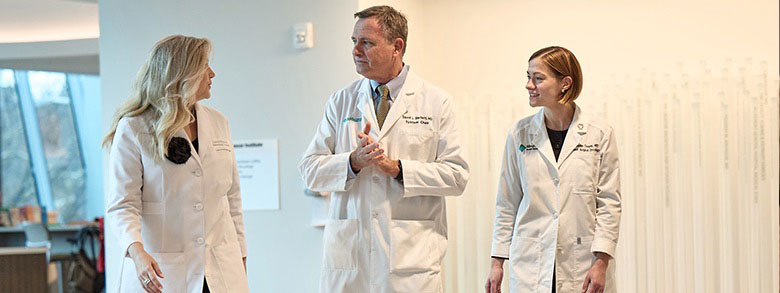
The AHN Medical Oncology Division provides a team of cancer specialists who work together to coordinate the best care possible throughout your treatment journey.
Working with a medical oncologist
One of the first steps you’ll take after receiving a cancer diagnosis is meeting with a medical oncologist. A medical oncologist focuses on the treatment and prevention of cancer by using therapies, such as chemotherapy, immunotherapy, targeted agents, and endocrine-based therapy. Your medical oncologist will work with other specialists on your team, like surgical oncologists and radiation oncologists, and plastic surgeons, to provide coordinated, comprehensive cancer care. Your team will determine the most effective treatment plan for your cancer, which may include one or more types of therapies.
Your medical oncologist will explain your cancer diagnosis and what stage of cancer you have. They’ll be with you every step of the way, helping you to understand your diagnosis and treatment while managing any symptoms that may arise during your cancer treatment.
-
Appointments
Cancer Institute(412) 578-HOPE
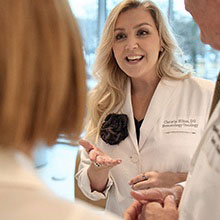
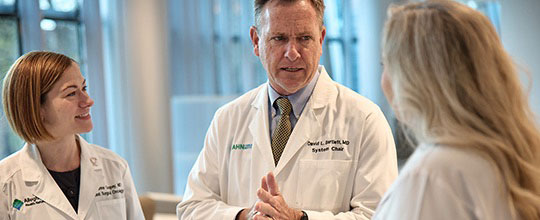
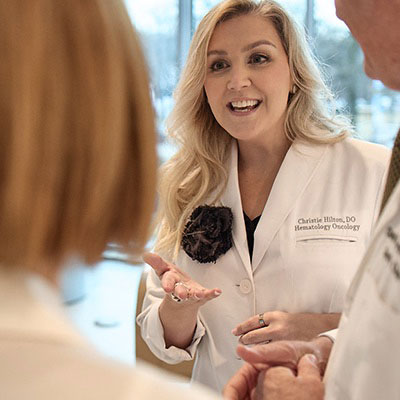

What is medical oncology?
Medical oncology is a medical specialty that focuses on treating cancer anywhere it appears in the body. A medical oncologist typically oversees your care from diagnosis throughout the course of the disease. Their role includes:
- Determining a diagnosis and cancer stage: A medical oncologist will often recommend several tests be performed to determine an accurate cancer diagnosis and stage.
- Communicating with you: Your medical oncologist will explain your diagnosis, coordinate care with other specialists, and walk you through your treatment options.
- Providing treatment: By collaborating with a team of cancer specialists, your medical oncologist will create a treatment plan specific to your cancer diagnosis that may consist of using one or multiple therapies. These medical treatments for cancer may be taken by mouth, intravenously, or by injection.
- Managing symptoms: Medical oncologists and their team of specialty trained clinical pharmacists and nurses are experts at managing symptoms of cancer and any side effects of treatment.
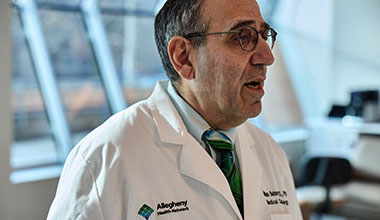
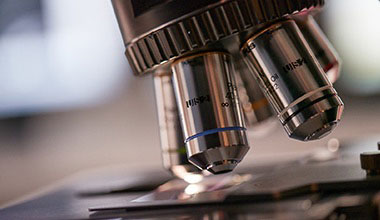


Medical oncology research
The AHN Cancer Institute is dedicated to cancer research and finding new advances to help treat cancer at all stages of the disease. We offer several treatment options, such as image-guided radiation, CAR T-cell therapy, and robot-assisted biopsies. Learn more about our latest cancer innovations and how they are helping to progress cancer treatment.
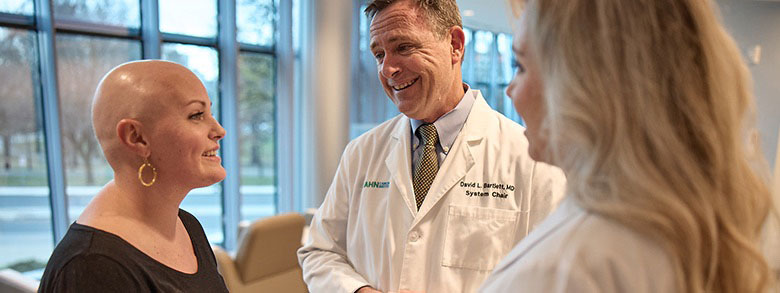
Medical treatments for cancer
Your team of specialists will decide what the best treatment plan is based on your cancer diagnosis. It may consist of a singular method or involve various treatments, such as chemotherapy and surgery. We also provide screenings to see if you qualify to participate in an ongoing clinical trial throughout your treatment. Participation in clinical trials is based on meeting eligibility criteria and is completely voluntary.
Intravenous and oral medication for chemotherapy
Chemotherapy is a powerful drug treatment that uses chemicals to slow or stop the growth of cancer cells in your body. Chemotherapy can be used to treat diverse types of cancer and can be used in combination with other treatments, like surgery and radiation therapy. There are several types of chemotherapy drugs available. Depending on the unique features of your cancer, your medical oncology doctor will make a tailored recommendation for treatment — which may include standard chemotherapy regimens, targeted treatment, novel therapies, or enrollment in a clinical trial.
The AHN Cancer Institute is one of the few centers in the country treating patients with advanced abdominal cancers using an innovative treatment called hyperthermic intraperitoneal chemotherapy (HIPEC) and HAIpatic pump. This groundbreaking therapy helps to prevent new cancer growth with strong doses of heated chemotherapy, circulated directly in the abdomen after your surgeon removes any visible cancer. HIPEC can cause fewer side effects than intravenous chemotherapy because it is a localized therapy. This approach kills microscopic cells left behind after surgery.
Hormonal therapy
Hormonal therapy is also called endocrine therapy. It’s a type of cancer treatment that can stop the body from producing specific hormones and slow or stop the growth of endocrine-sensitive cancer cells. It also helps ease symptoms of some types of cancer and cancer treatments. A medical oncologist may recommend endocrine-based therapy:
- For recurrent cancer (cancer that returns).
- For cancer that spreads (metastatic) or advanced cancer stages.
- Before surgery to help kill any cancer cells that have spread or reduce the size of a tumor. This is called neoadjuvant therapy.
- After other cancer treatments to help destroy any remaining cancer. This is called adjuvant therapy.
Biological therapy
Biological therapies either stimulate or suppress your immune system to help your body get rid of the cancer. These substances may already exist inside your body or may be made in the laboratory.
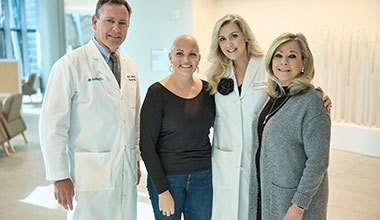



AHN offers an emerging biological therapy, known as chimeric antigen receptor T-cell immunotherapy or CAR T-cell therapy that’s only offered at a few cancer centers in the country. This therapy is designed for patients with aggressive blood cancers, such as leukemia and lymphoma. It uses a process called apheresis to collect a patient’s white blood cells and isolate the T-cells (disease-fighting immune cells). This therapy reengineers the patient’s T-cells into “fighter” cells that recognize and kill cancer cells using the CliniMACS Prodigy® machine on-site at AHN. We then infuse these cells back into the patient.
AHN is also using the groundbreaking TIL cell therapy in certain patients. Tumor-infiltrating lymphocyte (TIL) therapy that uses the patient's own tumor-infiltrating lymphocytes (white blood cells) to fight cancer. TIL cell therapy has, so far, shown its effectiveness in treating solid tumors.
Targeted therapy
Targeted therapy targets the proteins that control how cancer cells grow, multiply, and spread. Depending on the type of cancer you have, your medical oncologist may recommend one of these common types of targeted therapies:
- Small-molecule drugs: These drugs are small enough to enter the cells and target proteins inside them.
- Monoclonal antibodies: These are proteins designed in a lab to attach to specific targets found on cancer cells. Some monoclonal antibodies tag cancer cells so the immune system can better see and kill them. Other monoclonal antibodies can help prevent cancer cells from growing or cause them to self-destruct. Some antibodies are used to carry toxins to cancer cells.
Stem cell transplantation
Stem cell transplants are used by medical oncologists to restore blood-forming stem cells in patients who have lost theirs due to high doses of radiation therapy or chemotherapy. During this procedure, you’ll receive healthy blood-forming cells through a needle injected in your vein. The cells will travel to the bone marrow and will replace the cells that were destroyed during treatment. These cells can be taken from bone marrow, the bloodstream, or an umbilical cord. Transplants can be taken from your own body, a donor, or an identical twin (if you have one).
Bone marrow transplants
Similar to a stem cell transplant, patients who are undergoing cancer treatments may have bone marrow transplants to replenish damaged or destroyed bone marrow. Whether the bone marrow is used from the patient or via donation, it can aid in kill cancer cells, improve immune function, and may lead to long-term remission.
Support for medical oncology patients
As an AHN Cancer Institute patient, you'll receive comprehensive and holistic care focused on the treatment of your cancer. We also provide support services for your mental, emotional, and spiritual health. Once you have a diagnosis, you'll meet with a team of cancer specialists — which will include a medical oncologist, nurse navigator, and support professionals — to begin discussing your treatment options. Some of the additional support services you have access to include:
- Oncology rehabilitation and exercise programs to help you build your strength and keep you active.
- Nutrition counseling to maintain your appetite and ensure you're getting the nutrients your body needs during cancer treatment.
- A behavioral health specialist to help you work through anxiety, depression, body image, or intimacy issues you may be facing.
- Acupuncture and massage therapy to help relieve pain associated with cancer and symptoms from treatment.
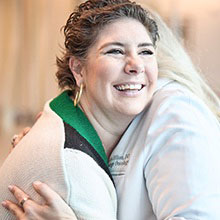

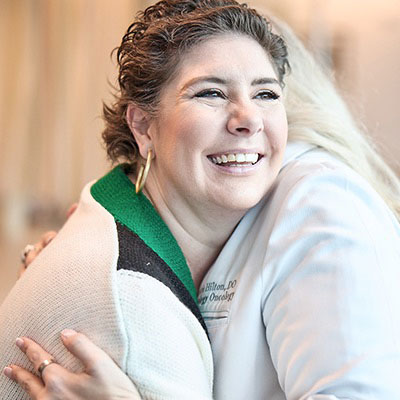

CliniMACS Prodigy is a registered trademark of Miltenyi Biotec, Inc. and used with permission.
Our medical oncologists
Our medical oncologists meet regularly with your treatment team to oversee your care. AHN medical oncologists are highly experienced and are dedicated to driving the future of cancer care through continuous research and clinical trials.

Colon and Rectal Cancer Center of Excellence
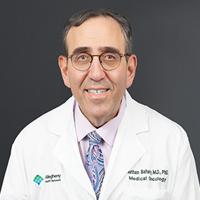
Esophageal and Gastric Cancer Center of Excellence

Gynecologic Cancer Center of Excellence
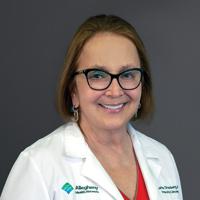
Head and Neck Cancer Center of Excellence
Medical Oncology Lead / Clinical Tr...
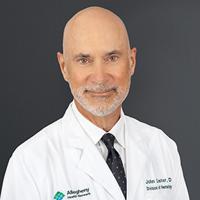
Hematologic Cancer and Cellular Therapy Center of Excellence

Liver Cancer Center of Excellence

Melanoma and Skin Cancer Center of Excellence

Molecular, Metastatic, and Rare Cancer Center of Excellence
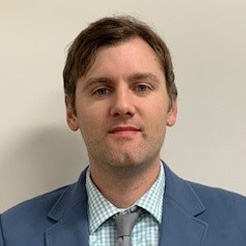
Neurological Cancer Center of Excellence

Clinical Trials Lead / Pancreatic Cancer Center of Excellence

Clinical Trials Lead / Sarcoma Center of Excellence
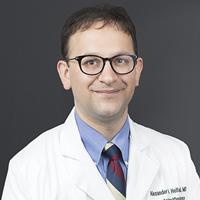
Urologic Cancer Center of Excellence
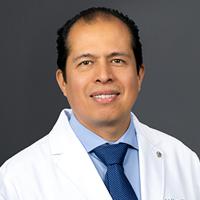
Director, Medical Oncology
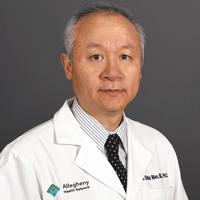
Chair, AHN Cancer Institute Urological Oncology Team
Types of cancers we treat
Your cancer diagnosis and treatment plan are unique to your specific needs. AHN doctors are highly trained in their specialty cancer treatment fields, ensuring your care is tailored to you.

Medical oncology appointments
Medical oncology services are available at many locations. And our call center professionals can help with your needs, whether that's a request for an appointment or a consultation close to your home or work.
Need to make an appointment?
Call (412) 578-HOPE (412) 578-4673 to schedule an appointment at any location within the Allegheny Health Network Cancer Institute or connect with a nurse navigator. You can also schedule an appointment online with a medical oncologist.
Locations
Visit our location page to find a medical oncology location near you.
Cancer clinical trials and research
The AHN Cancer Institute is a pioneer in cancer research and participates in clinical trials of new medical oncology therapies that are open for patients who qualify and wish to participate. Patients are screened for consideration with ongoing clinical trials at every stage of their treatment.
What is a clinical trial?
Clinical trials are studies that try to answer questions about new ways to treat cancer with medications, radiation, or surgical techniques. Previous trials have shown how new methods of treatment improve survival and quality of life, and reduce the risk of cancer returning.
You participate in a clinical trial only if you volunteer to do so and meet criteria for inclusion in the study, and you can stop participating in a trial at any time.
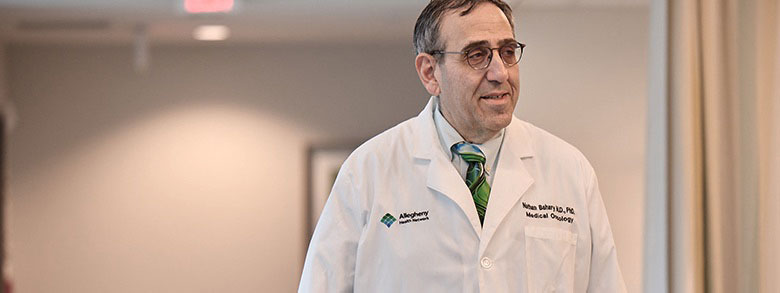
Who can join a clinical trial?
The plan for the trial, called a protocol, explains the goal of the trial and how the study will be conducted. Based on the questions the research is trying to answer, each clinical trial protocol outlines specific criteria necessary to be eligible to join the trial.
Common criteria for entering a trial are:
- Having a certain type or stage of cancer.
- Having received a certain kind of therapy in the past.
- Being in a certain age group.
Federal rules help ensure that clinical trials are run ethically, with your rights and safety protected. These rules are in place to ensure that you are not put at increased risk by participating in the trial, and that the results of the study are accurate and meaningful.
Currently active cancer clinical trials
If you would like to participate in a clinical trial and help our innovative team discover groundbreaking cancer solutions, ask your doctor if you are eligible to participate.
Clinical trials currently active and open for participation:
- Blood cancer
- Brain cancer
- Breast cancer
- Colorectal cancer
- Gynecologic cancer
- Head and neck cancer
- Liver and hepatocellular perihilar cholangiocarcinoma cancer
- Lung cancer
- Melanoma
- Oral cavity, pharynx, esophagus, and gastric cancer
- Pancreas cancer
- Urothelial, bladder, renal, and kidney cancer
- Other multiple cancer types
Refer your patient to an AHN Cancer Institute specialist
There are two ways for medical professionals, who are not a part of Allegheny Health Network, to refer their patients to an AHN Cancer Institute specialist and request their first appointment. You can:
- Call (412) 578-HOPE (412) 578-4673 to speak with an AHN Cancer Institute scheduling coordinator. It's the easiest way to make your referral, and we'll contact your patient directly within 24 hours to coordinate their care.
- Go to Find Care to find the right AHN specialist and the most convenient location. Then refer your patient, provide relevant patient details, and request an appointment directly from the doctor's profile.
For more information about referring your patient to an AHN specialist, read the Independent Physician Referral FAQs.

After referring your patient
Once your patient is receiving care from an AHN specialist, you can view their test results, see their treatment plan, follow their treatment progress, and collaborate with our team using the EpicCare® Link™ platform.
If you are new to EpicCare Link, or need to request your own EpicCare Link account, read: EpicCare Link for Patient Follow-up, for user instructions and new account request forms.
When EpicCare Link is not an option for a patient's AHN medical records
If you can’t access your patient's AHN test results through the EpicCare Link platform, your patient will need to complete and submit the correct AHN Medical Records Release form, based on their state of residency. Support your patient’s request by downloading the correct medical records release form for them:
EpicCare® is a registered trademark of Epic Systems Corporation and used with permission.
EpicCare® Link™ is a trademark of Epic Systems Corporation and used with permission.

